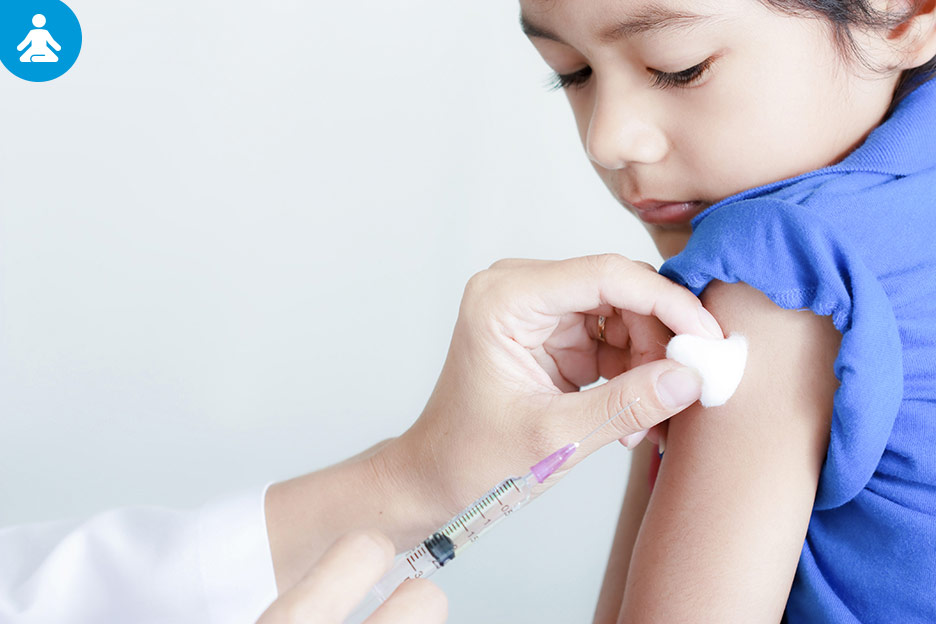We can all agree that our children’s health is more important than anything. A safe and effective way to prevent many diseases in children is vaccination. Aside from the unpleasant prick of the needle, vaccination is full of benefits. Do you know how to prepare for your child’s next vaccine?

How vaccination can benefit your child
As a parent, you would do anything to ensure that your child is happy and healthy: preparing yummy, healthy meals to satisfy those hunger pangs, playing hide-and-seek to have fun together, snuggling on the rocking chair to ease sadness… so it only makes sense to get your child vaccinated against a number of diseases. Indeed, vaccination allows the child’s body to build its immune system’s defenses against several diseases that can have significant consequences (ex: deafness, paralysis, respiratory problems, brain damage). A vaccine is like a little army of soldiers that readies the body to fight diseases even before they appear; vaccination stops the disease from developing and, in other cases, significantly decreases its symptoms.
Vaccines have prevented the suffering and death of many children in addition to practically eradicating some diseases from the planet. Deciding to not have your child vaccinated will make him or her vulnerable to those diseases. And if a large number of children remained unvaccinated, we would see these preventable diseases return.
The safety of vaccines
There is much debate surrounding the safety of vaccines. In the past, they have been linked to developmental problems and autism, among others. However, numerous studies have examined this possible link and have concluded that there actually isn’t one. In fact, vaccination represents one of the safest medical technologies of our time. Although some adverse effects can occur after your child gets a vaccine, the benefits on his or her health far outweigh the possible risks. Side effects of vaccines are infrequent, rather mild and short-lived. Here are the most common ones:
- pain, swelling and redness at the injection site;
- fever;
- irritability;
- increased sleepiness.
The most significant risk of vaccines, which is fortunately very rare, is an allergic reaction. It can manifest itself by the appearance of hives, swelling of the throat and mouth, as well as difficulty breathing. This reaction can occur after taking any medication or food, so vaccines are no exception. To make sure that there is a rapid response in case of an allergic reaction, you must stay in the waiting room for 15 minutes after the child has been vaccinated.
Vaccination schedule
In Québec, there is a vaccination schedule for children to get their vaccines at no charge and at the right time. Some parents may dislike the idea of vaccinating their child when he or she is very young, but the vaccination schedule does in fact indicate that the first vaccine is to be given at the age of 2 months. The diseases against which we get vaccinated usually occur in young children, so they must get the protection they need as soon as possible. However, if your child’s vaccination schedule has not begun and he or she is over 2 months of age, it’s not too late. At any moment, the appropriate vaccines can be given on a slightly different schedule.
During a vaccination appointment, your child may possibly receive several vaccines. His or her body is fully capable of creating defenses against several diseases at a time. Also, some vaccines require more than one dose to provide optimal protection; it is therefore important to give subsequent doses when needed. Some vaccines have a limited duration of action, such as a few years, which is why a booster shot must be given at a later date to ensure that the child remains protected against the disease.
How to prepare for your child’s vaccination
It’s natural to feel worried about your child’s vaccination appointment, but here are a few tips to make the visit to the doctor as painless as possible:
- Bring your child’ vaccination booklet to each appointment.
- Relax. If you remain calm, your child will most likely be less nervous too.
- Hold your child in your arms or nurse your baby as the vaccine is given.
- Distract your child with a lullaby or by reading a book as the vaccine is given.
- Give your child a dose of acetaminophen before or after the vaccine to prevent discomfort or pain at the injection site.
- Apply a cold compress on the injection site.
- Make an appointment for the next vaccine right away.
It’s up to you to protect your child against disease. Having him or her vaccinated, although not mandatory, is as important as his or her annual check-up. If you would like more information on vaccines, the vaccination schedule or the diseases targeted by vaccines, consult the “Vaccination” section on the website of Québec’s Ministère de la Santé et des Services Sociaux at http://www.msss.gouv.qc.ca/sujets/santepub/vaccination/index.php?accueil_en. Your pharmacist can also give you the answers you seek and help you make the best decisions for your child. Because nothing is as valuable as your precious child!
Where can you find a pharmacy to get vaccinated?
If you need a vaccine, schedule an appointment with a nurse at a Brunet near you! >>
texte